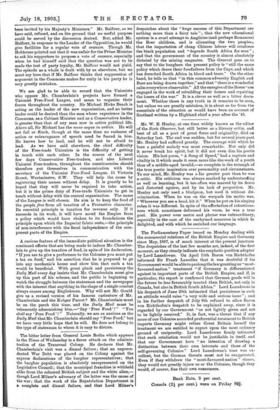Mr. W. E. Henley, at one time widely known as
the editor of the Scots Observer, but still better as a literary critic, and best of all as a poet of great force and originality, died on Saturday last. The end was sudden, but for several years past Mr. Henley had suffered greatly. The courage with which he bore a painful malady was most remarkable. Not only did it never break his spirit, but it did not even dim his poetic vision. His last poem, "A Song of Speed," had a rapture and vitality in it which made it seem more like the work of a youth than of a middle-aged invalid,—so complete is the triumph of the true poetic inspiration over personality and circumstance. To our mind, Mr. Henley was a far greater poet than he was a critic. His criticism was always marked by understanding as well as learning, but it too often was marred by its fierce and distorted egoism, and by its lack of proportion. Mr. Henley not only used a bludgeon, but used it without dis- crimination. When he was on the warpath his motto was, "Wherever you see a head, hit it." When he put on his singing robes it was different. In spite of the affectation of robustious- ness which sometimes deformed his verse, he was a true poet. His power over metre and phrase was extraordinary, especially in the case of the unrhymed measures in which he delighted, and with which he enriched our language.










































 Previous page
Previous page